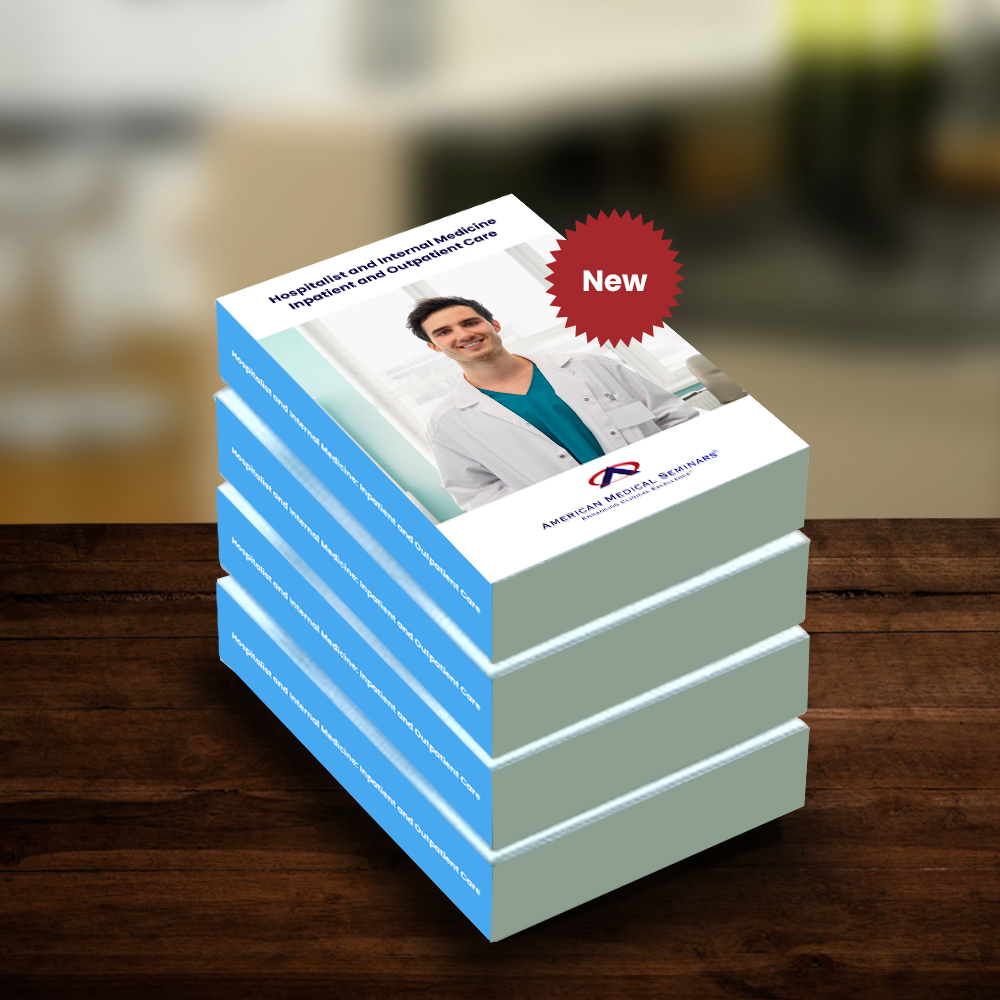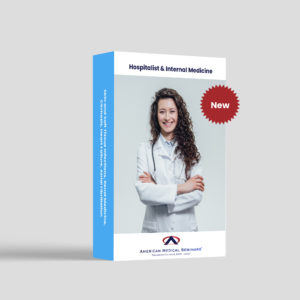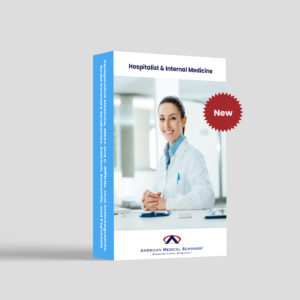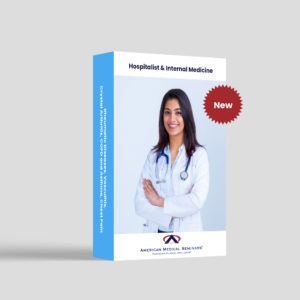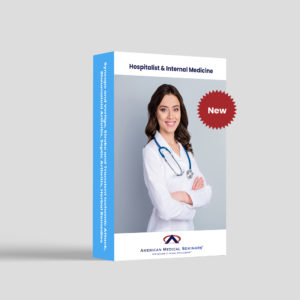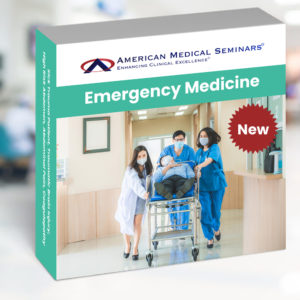Accreditation
AMA
American Medical Seminars, Inc. designates this live activity for a maximum of 20 AMA PRA Category 1 Credits™. Physicians should claim only the credit commensurate with the extent of their participation in the activity.
Accreditation Statement
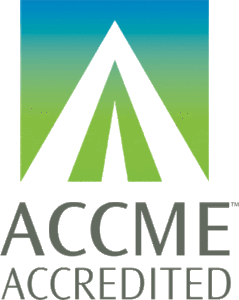 American Medical Seminars, Inc. is accredited by the Accreditation Council for Continuing Medical Education (ACCME) to provide continuing medical education for physicians.
American Medical Seminars, Inc. is accredited by the Accreditation Council for Continuing Medical Education (ACCME) to provide continuing medical education for physicians.
Title: 2022 Hospitalist and Internal Medicine: Inpatient and Outpatient Care
Course ID: W-20220613-HMIM
Faculty: Lawrence H. Brent, M.D.; Vandana Y. Bhide, M.D., F.A.C.P., F.A.A.P., A.B.I.H.M.; and Kendal Williams, M.D., M.P.H.
Original Release Date: July 1, 2022 Expiration Date: July 1, 2025
Topic 1: Approach to the Patient with Rheumatic Diseases Upon completion of this session, the participant should be able to: EBM, COMP
- Demonstrate the importance of the history and physical exam including patterns of joints involvement and extra-articular findings in evaluating patients with rheumatic diseases.
- Distinguish inflammatory (i.e. rheumatoid arthritis) and structural arthritis (i.e. osteoarthritis).
- Differentiate patterns of articular involvement associated with different arthritides.
- Utilize laboratory and radiological studies in the evaluation of patients with rheumatic diseases.
Topic 2: Vasculitis Upon completion of this session, the participant should be able to: COMP
- Utilized the classification of vasculitis.
- Specify the diagnosis of specific vasculitis based on clinical, laboratory, and pathologic features.
- Prescribe treatment for patients with vasculitis based on their diagnosis.
Topic 3: Crystal Arthritis Upon completion of this session, the participant should be able to: EBM, COMP
- Demonstrate the clinical presentations and manifestations in the course of gout.
- Monitor and prescribe treatment for patients with gout according to the EULAR and ACR recommendations and guidelines.
- Demonstrate the clinical presentations, manifestations, and treatment of calcium pyrophosphate deposition disease (CPPD) and pseudogout.
Topic 4: Update on the Management of COPD and Asthma in the Hospitalized Patient Upon completion of this session, the participant should be able to: EBM, COMP
- Perform initial management and stabilization of the patient with asthma or COPD exacerbation and distinguish between the strategies for each condition.
- Develop an evidence-based strategy for the management of COPD based on the GOLD criteria.
- Prescribe an effective therapeutic strategy for asthma, taking into account recent studies on the safety and effectiveness of various agents.
- Detect conditions that may mimic asthma or COPD in the clinical setting.
Topic 5: Update on the Evaluation of Chest Pain Upon completion of this session, the participant should be able to: COMP
- Based on recent standard of care publications, review the contribution of history, physical exam, and EKG findings to the evaluation of chest pain.
- Distinguish ischemic EKG changes from their common mimics.
- Apply the use of novel and standard cardiac biomarkers to the diagnosis of ACS.
- Based on the guidance from the ACC/AHAS and recent significant research studies, determine the best evaluation strategy for the individual chest pain patient.
Topic 6: The Evaluation and Management of Syncope and Vertigo Upon completion of this session, the participant should be able to: EBM, COMP
- Appropriately evaluate patients with syncope or vertigo.
- Formulate a diagnostic evaluation strategy of syncope or vertigo that is based on best practices and the 2017 ACC/AHA/HRS guidelines.
- Debate the value of the various diagnostic approaches to the workup of syncope.
- Prescribe an effective therapeutic strategy for the management of both syncope and vertigo per the 2017 ACC/AHA/HRS guidelines.
Topic 7: Update on the Management of Stroke and Transient Ischemic Attack Upon completion of this session, the participant should be able to: COMP
- Assess common presentations of cerebrovascular insufficiency.
- Prescribe the initial management of patients with a suspected acute CVA.
- Apply cutting edge strategies and therapies for the management of hemorrhagic and thrombotic strokes.
- Distinguish between stroke and TIA and appropriately assess the patient with TIA for early risk of stroke.
- Formulate an effective post-stroke secondary prevention plan as per the AHA/ASA guidelines.
Topic 8: Rheumatoid Arthritis Upon completion of this session, the participant should be able to: EBM, COMP
- Demonstrate the role of genetics, environmental factors, immune cells, and proinflammatory cytokines in the pathogenesis of rheumatoid arthritis.
- Illustrate the clinical features, extra-articular manifestations, and complications of rheumatoid arthritis.
- Utilize and compare various methods of measuring disease activity in rheumatoid arthritis.
- Compare and contrast the mechanisms of action of current and emerging therapies for RA and prescribe treatment for patients with rheumatoid arthritis according to ACR guidelines.
Topic 9: Septic Arthritis Upon completion of this session, the participant should be able to: GL, COMP
- Determine the risk factors associated with septic arthritis.
- Utilize the British Society of Rheumatology Guidelines for management of the hot swollen joint in adults to differentiate septic arthritis from other causes of acute monoarticular arthritis.
- Utilize epidemiological and clinical clues to determine bacterial etiology in patients with septic arthritis.
Topic 10: An Evidenced-Based Look at Commonly Used Herbal Remedies Upon completion of this session, the participant should be able to: EBM, COMP
- Evaluate the efficacy of commonly used botanicals.
- Evaluate common herb-drug interactions.
- Apply caution with use of high-risk herbal agents.
Topic 11: Update in Perioperative Medicine Upon completion of this session, the participant should be able to: EBM, COMP
- Appraise pre-operative cardiac risk stratification and management strategies, as per the ACC/AHA Risk Clinical Predictors.
- Determine the role of non-invasive stress testing, echocardiography, coronary angiography and the use of biomarkers to assess peri-operative cardiac risk, as per the ACC/AHA (2014) Perioperative CV Evaluation Guidelines.
- Relate the indications for beta blockers, statins and aspirin in the peri-operative period.
- Evaluate the bleeding risks of commonly prescribed medications and OTC supplements taken pre-operatively.
Topic 12: Challenging Infections: MRSA and C. difficile Upon completion of this session, the participant should be able to: COMP
- Assess and apply appropriate treatment strategies for different types of methicillin resistant staph aureus infections.
- Employ rational use and relate the precautions of newer antibiotics when treating resistant bacteria.
- Distinguish Guideline based treatment of Clostridium difficile infections.
Topic 13: Direct Oral Anticoagulants Upon completion of this session, the participant should be able to: EBM, COMP
- Differentiate the advantages and disadvantages of commonly used anticoagulants.
- Employ evidence-based anticoagulation bridging regimens.
- Assess the approved indications for various anticoagulation agents.
- Apply the evidence-based indications for anticoagulation in hospitalized patients.
Topic 14: Update on the Management of Acute Coronary Syndromes Upon completion of this session, the participant should be able to: EBM, COMP
- Distinguish the forms of ACS and their relative prognoses.
- Based on the most recent AHA/ACC guidelines, apply the appropriate initial management of patients experiencing acute coronary syndromes.
- Based on the most recent AHA/ACC guidelines, categorize the therapeutic options for patients with unstable angina and post-MI.
- Based on the most recent AHA/ACC guidelines, employ the secondary prevention strategies for patients who have experienced an acute coronary syndrome.
Topic 15: Delirium, Dementia, and Psychosis – The Diagnosis and Management of the Inpatient with Mental Status Change Upon completion of this session, the participant should be able to: EBM, COMP
- Apply a diagnostic approach to the hospitalized patient with acute mental status change.
- Discuss the differential diagnosis of psychosis in the hospitalized patient.
- Based on a systematic review of the best evidence, formulate an evidence-based management strategy for delirium in the hospital setting.
- Develop an evidence-based screening and treatment protocol for the prevention and management of alcohol withdrawal syndromes.
Topic 16: Overview of the Inpatient Management of Skin and Soft Tissue Infections Upon completion of this session, the participant should be able to: EBM, COMP
- Review the clinical presentation and categorization of common skin and soft tissue infections.
- Differentiate common non-infectious conditions that can mimic skin and soft tissue infections.
- Based on evidence from the CDC and standard of care publications, recognize and incorporate the changing epidemiology and resistance patterns impacting skin and soft tissue infections into therapeutic plans.
- Recognize the types of drug-associated rashes and formulate an effective treatment plan for each.
Topic 17: Update in Inpatient Renal Medicine Upon completion of this session, the participant should be able to: COMP
- Review the evaluation of acute renal failure in the inpatient setting.
- Discuss the forms of dialysis used in hospitalized patients.
- Review the management of hyperkalemia.
- Discuss the management of fluid overload in patients with advanced kidney disease.
- Review best practice strategies for the use of diuretics in hospitalized patients.
Topic 18: Cirrhosis Upon completion of this session, the participant should be able to: EBM, COMP
- Apply evidence-based treatments for common manifestations of cirrhosis, including ascites, spontaneous bacterial peritonitis, esophageal variceal bleed, and hepatic encephalopathy.
- Evaluate prognostic scoring systems for alcoholic cirrhosis.
- Apply evidence-based treatments for hepatorenal syndrome.
Topic 19: Systolic and Diastolic Heart Failure Upon completion of this session, the participant should be able to: GL, COMP
- Appropriately manage decompensated heart failure in hospitalized patients.
- Assess the indications for positive inotropic agents and ultrafiltration in systolic heart failure.
- Distinguish the treatment of systolic versus diastolic heart failure, as per the 2013 ACCF/AHA Guidelines for heart failure management.
Topic 20: Atrial Fibrillation in the Hospitalized Patient Upon completion of this session, the participant should be able to: EBM, COMP
- Assess and evaluate treatment options for atrial fibrillation with rapid ventricular response, as per the 2010 HFSA Guidelines.
- Employ appropriate anticoagulation strategies for atrial fibrillation.
- Distinguish the advantages of rhythm versus rate control treatment strategies, 2014 ACC/AHA Guidelines for atrial fibrillation management.
- Determine the possible underlying causes of CHF exacerbations.
Topics & Objectives
- The receipt for any incentive-associated purchase will designate the value of the gift card separately from the cost of the learning activity.
- This incentive may have implications on your tax reporting obligations. Any reimbursed amount must be declared as personal income for tax purposes.

